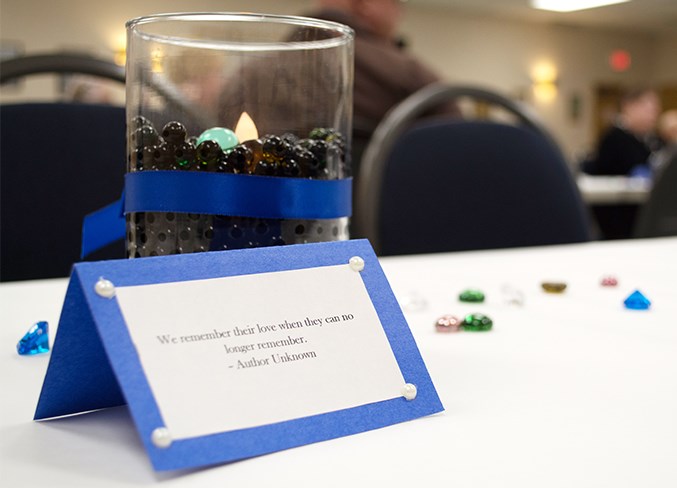Between serious topics and moving stories about family members losing their mental abilities, brightly-coloured gems dotted the tables at the Athabasca Seniors Centre April 3, as the Athabasca Extendicare held its second Dementia Education Night.
About 34 people came out to learn about dementia, its progression and how to interact with people through those progressions.
Extendicare administrator Joan Cody made a presentation, bringing her own personal and familial experiences into her talk. She spoke to the audience about making people with dementia feel valued, noting that caregivers should also manage stress and make sure their own relationships or jobs do not suffer.
In an interview, Cody said the first event was held in March 2017, and she thought this year's went well. She said she was happy to provide education about dementia and a little bit of day-to-day support.
"Even if we just reach 25, 30 people, it's reached somebody who needed it, and that's the most important part," she said. "And to know that they're not alone."
A portion of the evening was dedicated to the work of Teepa Snow, who a trainer and consultant on care for patients with dementia. Snow uses the "gems" model to help identify brain changes, and the cognitive model acknowledges that everyone’s abilities can change in a moment, according to Snow's website.
A "sapphire," for instance, means "optimal cognition, healthy brain," and the person characterized as such "can be flexible in thinking and appreciate multiple perspectives," according to the model.
The model also states that a "pearl" refers to "hidden within a shell," where "personhood survives, although all other capabilities are minimal; Understanding input takes time: go slow and simplify for success."
Athabasca resident Bunny Myrtle attended the event this year as well as in 2017. She said she has had friends with dementia, and her husband has been diagnosed with Parkinson's disease and dementia.
"It was informative then, and I am finding that now as things progress, I need more of those reminders," she said. "And we need, I guess, to tap into the community ... At that time is was for one reason. Now it's another reason, and it just progresses."
Myrtle said she found value in the event, and she brought friends and family members with her.
"My son and his wife, and then other friends who are also going through that, I brought them all with me tonight to make sure that they were aware," she said. "Because even if they can go home with one or two things that can help them cope with the situation they find themselves in, it's very valuable."
She also said community events for seniors have helped her family with things like their financial decisions, preparing for retirement, and dealing with dementia and arthritis.
"The programs in the community have been really helpful," she said. "Just all the things that a senior faces."
Cody said the Extendicare would like to keep holding these events. She said the group was diverse, and noted that some people in the audience were caring for loved ones at the local facility while others were not.
"Even if they learn one thing, even if they learn one little key," she said. "Even if they just know now that they're not alone."
She also said people who missed the event can check out the Alzheimer Society of Canada's website at www.alzheimer.ca or Teepa Snow's website at www.teepasnow.com for more information.



